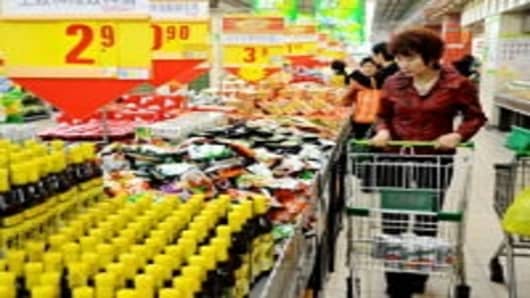On June 23 the Financial Times carried an article written by China's Prime Minister Wen Jiabao in which he argued that macro-economic measures taken by the government over the last year had contained inflation. Since 2010, the government has increased required reserve ratios 12 times for banks and quadrupled interest rates.
Wen's remarks calmed investors, who were hoping that cooling policies were reaching an end. The Shanghai A-share index shot up 2.16 percent, and Hong Kong's Hang Seng 1.90 percent the day after Wen’s article was published.
On Monday, however, Wen,who is traveling to Europe, was quoted by the Hong Kong Media as saying for the first time that China will find it hard to keep inflation below 4 per cent in 2011. The markets though chose to react more to his earlier remarks.
Conventional wisdom of most economists is that China’s headline inflation is under control. Jim O’Neill, Chairman of Goldman Sachs’Asset Management, argued this, and an analyst at Royal Bank of Canada agreed and wrote: “The fact that Wen is now predicting price pressures will ease despite these near-term risks suggests that he has received relatively firm assurances from his economic advisers that the situation is set to improve in coming months.”
O’Neill and RBC must be looking at a different China than the one in which I operate a business and face soaring salaries and rents. It is true China does not face 20 percent annual inflation like Vietnam; however, measures should not be loosened in July as many analysts predict will happen when China’s top leaders gather to discuss economic policy for the second half of the year. Even if official inflation is under control, food prices soared 11.7 percent in May as drought and Japan’s nuclear disaster have damaged the food supply chain.
Contrary to what O’Neill and RBC think, things will only get worse in the short-term as multinationals start to transfer higher costs to consumers and as new university graduates enter the labor force in July.
My firm has interviewed several dozen large multinationals in the past month. Fearful of incurring the wrath of the Chinese government as Unilever did for announcing price hikes, many reported delaying raising prices but would strongly consider raising them in the next quarter. Instead, Coca-Cola and Pepsi shrunk bottle sizes from 600 ml to 500 ml. YUM Brands! and Starbucks added more expensive items, but McDonald’s raised prices.
I asked my office landlord recently if rent would go up 10 percent when our contract ends at the end of this year. She laughed and told me 20-30 percent at least. Taxi prices will rise 20 percent in Shanghai and other cities soon. The Shanghai government has said taxi fares will be raised after the public discussion period in June. Fuel surcharges have also gone up in Shenzhen and Beijing.
Plus tax breaks implemented during the crisis are being rescinded. In other words, a perfect storm of rising wages, rents and commodities will force most companies to begin transferring prices to the end consumer. With brownouts set to hit 10 manufacturing oriented provinces this summer, pricing pressures will only continue.
In order to stave off potentially destabilizing inflation and a housing bubble, the government should leave tightening measures in place in the short-term. Until the U.S. dollar regains its strength or America ends its wars in the Middle East, causing commodity prices to drop, there is no way inflation is a short-term issue for China.
Measures to cool the economy are creating massive pent up demand in a number of sectors. For the past year and a half, transactions in the residential real estate market have essentially come to a stop. Aside from multi-million dollar mega mansions whose prices are soaring, sales volumes are down 70 percent in Shanghai and prices are remaining flat or even dropping as stringent measures and reduced access to credit freeze the market.
If restrictions are eased, another bull market in the real estate sector will appear, due to the many investors and younger couples who have been sitting on the sidelines. Proof of the pent up demand is that Chinese have been looking to invest abroad more. Vancouver’s real estate prices last year rose 14 percent because of the influx of mainland Chinese money, and according to Canada’s Frontier Centre for Public Policy is now the third most expensive English speaking city in the world after Hong Kong and Sydney (also favorite investment spots for mainland Chinese).
The world is now too economically interrelated to assume inflation in China won’t affect the world economy. Export prices to America are already increasing, and many companies like Nike are shifting production away from China to cheaper markets like Indonesia. While the Chinese government is implementing the right measures and acting forcefully to stop inflation, there are no easy solutions.
Ben Bernanke’s loose monetary policies over the past several years have scared investors away from the U.S. dollar towards developing markets and commodities.
If left unaddressed, China’s current dangerous inflation levels coupled with investors’ increasing interest in the China market can only lead to higher prices for the world market in the short and long term.
Shaun Rein is the founder and managing director of the China Market Research Group (www.cmrconsulting.com.cn) a strategic market intelligence firm, and is based in Shanghai. Follow him on Twitter at @shaunrein.


